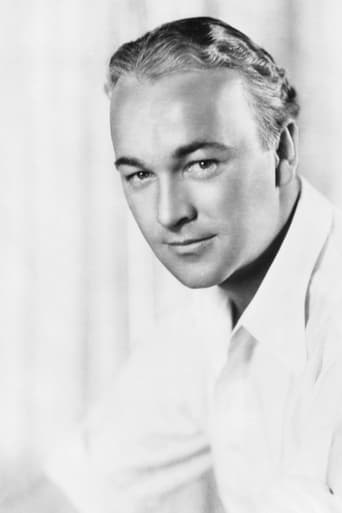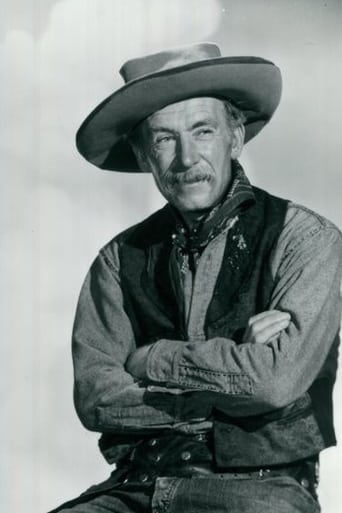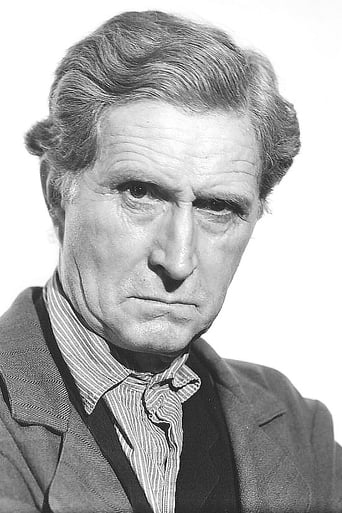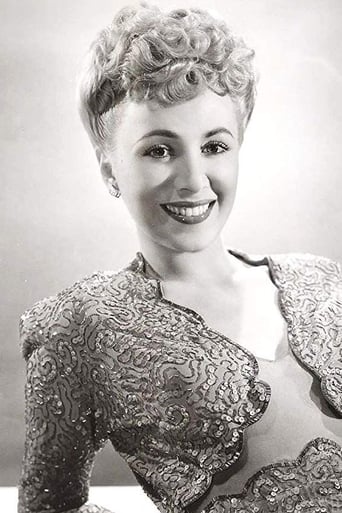Matialth
Good concept, poorly executed.
LouHomey
From my favorite movies..
Lidia Draper
Great example of an old-fashioned, pure-at-heart escapist event movie that doesn't pretend to be anything that it's not and has boat loads of fun being its own ludicrous self.
classicsoncall
If only the Hoppy line in my summary statement applied to our border patrol guys today. Times sure change don't they? Today they have to process the paper work.Well this time out, Hoppy and his sidekicks California (Andy Clyde) and Johnny (Jay Kirby) are Texas Rangers investigating the disappearance of laborers from south of the border. They have the unique distinction of getting arrested twice in the same picture, something I don't think I've ever seen before. The thought just came to me that it was too bad that Hoppy wasn't a singing cowboy like his contemporaries Roy Rogers and Gene Autry. When they wound up in jail they would take advantage of the situation by singing a song. Heck, even Ricky Nelson did it in "Rio Bravo".For old time Western movie fans, this one's a treasure trove for familiar faces who went on to bigger and better things. Robert Mitchum was still going by 'Bob' when this picture was made, and future Cisco Kid Duncan Renaldo is on hand as a Mexican Commandante. But the best is George Reeves in the role of a Mexican laborer in love with the film's heroine Senorita Inez La Barca (Claudia Drake). He's not on screen very much, and forgive me for saying so because I like the guy, but every time he's on it's hilarious. His Spanish accent is tortured and the pencil thin mustache is killer. You really have to see him to appreciate it.Say, check out that scene in the early going when Hoppy lassos an outlaw's feet some twenty feet above him on a giant boulder. Anyone think that's actually possible? If so, you'll really love the scene when the senorita smuggles a gun into jail for the boys, it's hidden in a pot of beans with bullets concealed in the tacos. Too bad about Mitchum though, Hoppy drilled him in the final shootout. We never find out what he thought about being called a two-bit gunman.
dougdoepke
More plot-heavy than most. The trio are Texas Rangers trying to bust up a silver mine operation that's luring Mexican illegals (sound familiar?) across the border. On the way, they have to get past a cantankerous Mexican senorita (Drake) and a petty tyrant—hanging judge (Simpson). Some good scenery, especially the roaring Kern River, long a favorite of these oaters. Clever action climax does a neat twist on the old circle-the-wagons maneuver. I also like the charming dinner scene with the Commandant (Renaldo) that's well scripted and nicely played.There's also a couple of interesting lesser-knowns to add to the stars-of-the-future list (Mitchum, Reeves, Renaldo). Claudia Drake managed a shot at immortality by landing a key role in the noir cult classic Detour (1945). Here, she gives a spirited performance as the willful senorita that really over-shadows everyone else. However, perhaps most notable and surprising is the screenplay. It's credited to Michael Wilson who later penned such A-list classics as A Place in the Sun (1951), Bridge on the River Kwai (1957), and Lawrence of Arabia (1962), among others. A victim of the early-50's blacklist, several of these were written undercover, but have since been restored to his credit list. Here, the plot deals with such potential political themes as exploited workers, a company town, and a rich man making up his own laws. So, perhaps Wilson's participation is not so surprising after all.
zeppo-2
A number of Hoppy films revolve around a mining background, they sure wanted to get their money's worth out of that particular mine setting! This time it's a crook who is using forced labour to run his mine.Hoppy tracks missing Mexican labourers to both the mine and town that is ruled by the elaborately named villain, Orestes Krebs.Framed by Krebs as both judge, jury and executioner, Hoppy, California and Johnny are sentenced to hang. Initially suspected to be outlaws by the leading lady, Claudia Drake as Inez, (a common occurrence it seems for Hoppy and his companions), she does however see the light and helps the friends to clean up the whole crooked town.A fairly lightweight entry in the series, with enough action and story to keep things bubbling to the end. Krebs makes a suitable evil schemer, who doesn't know when he's beaten and Hoppy gets plenty of opportunity to use his patented steely gaze at the proceedings.
bsmith5552
"Border Patrol" is yet another entry in the long running Hopalong Cassidy series produced by Harry "Pop" Sherman between 1935 and 1944. The "Hoppy Trio" consists of Hoppy (William Boyd), California (Andy Clyde) and Johnny Travers (Jay Kirby). This time the boys are members of the Border Patrol of the title. The story opens with the trio coming upon a fleeing Mexican worker who has been shot trying to escape to his homeland. Mexican ranch owner Inez La Baroa (Claudia Drake) comes upon them and accuses them of murdering her ranch hand. She takes them to the Commandant of the Mexican Border Patrol (Duncan Renaldo) who straightens things out. It seems that Mexican migrant workers have been crossing the border to work in the U.S. never to be heard from again. Hoppy decides to investigate the matter. The trail leads to the town of Siver Bullet run by a Judge Roy Bean type named Orestes Krebs (Russell Simpson) who has the boys arrested. Krebs is an everyman in the town being mayor, sheriff and judge, among others. With the aid of Inez they overpower jailer Pierce Lydon and escape. They discover that Krebs has been imprisoning the Mexican workers led by Don Enriquez Perez (George Reeves) and forcing them to work in his silver mine. Well, Hoppy and the boys soon rectify that situation. Frequent series director Lesley Selander gives us an action packed adventure with plenty of fisticuffs and gunfights, as well as, the customary spectacular outdoor scenery which was common to the series. This film is also notable for the screen debut of Robert Mitchum who plays a Krebs gunman. Mitchum would go on to appear in several other Hoppys before his breakthrough role in "The Story of G.I. Joe" (1944). George Reeves, who would gain greater fame as TV's "Superman", appears briefly as the leader of the Mexican workers. He too would play a variety of roles in the series, even so far as to appear as one of the "Hoppy Trio" in a couple of pictures. Russell Simpson was perhaps better known as Pa Joad in John Ford's "The Grapes of Wrath" (1940). Duncan Renaldo would shortly achieve fame as "The Cisco Kid" in a series produced by Monogram Pictures and a subsequent TV series. Top notch Hoppy.




